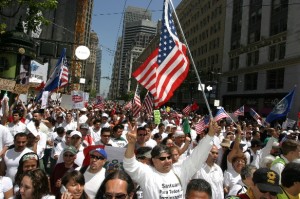The presence of Hispanics in the U.S. is partly defined by an intertwined history of America and Mexico and their shared border and the undocumented workers that come by the thousands chasing the American dream every year.
This puts Hispanics from the past and the present in a unique position compared to other groups such as Irish or Italian immigrants from the past. Latinos are not just citizens but also have roots that run deeper in this country than what many Anglos can claim.
“Our family was there when it was Spain, when it was France, when it was Mexico, the Republic of Texas, the United States, the Confederacy,” Leticia Van de Putte, a Texas state senator from San Antonio, said. “Our family’s always been in the same place; it was the damn government that kept changing.”
Tony Yapias, the director of the Proyecto Latino de Utah and a leading Hispanic activist in the state, said, “This was Mexico,” referring to the land stretching from the Mormon Temple to Utah’s State Capitol and the Great Salt Lake earlier this month. “No one asked Brigham Young for his papers,” Yapias said of the Mormon pioneer who arrived in Utah in 1847.
Yet, despite this long history, it is the policy debate over immigration and more specifically illegal immigration from Mexico that dominates and shapes Latino political debates of both major parties.
The culture and language of Hispanics played a big part in America’s past despite being marginalized as a group for a century and a half. This marginalization has led many to believe in the present that Hispanics are a brand new segment in American society, when in actuality they have been here since before the United States even existed.
The Pew Research Center estimates that by 2050, Hispanics will be 29% of the population and whites will be a minority at 47%. As of 2009, there were 48.4 million Hispanics in America, nearly 16% of the population.
Already, Latino voters in two of the nation’s largest states, California and Texas, are dominant factors in state-wide elections. Latinos are mayors of Los Angeles and San Antonio, and a number of other Hispanic politicians sit in their respective state houses. These numbers are only expected to increase over time in these states and others.
This growth will give Hispanics more leverage in America’s future at a time when the country’s white population is aging and decreasing and its brown population is young and growing.
“In the long run we’ll win,” says Arturo Rodriguez, the president of the United Farm Workers union and son-in-law of César Chávez. Chávez founded the union and is a civil rights hero to Latinos.
“Why? Because we have the numbers,” he continued.


[…] Photo from https://www.latinovations.com/2010/09/28/hispanicization-of-america/ […]